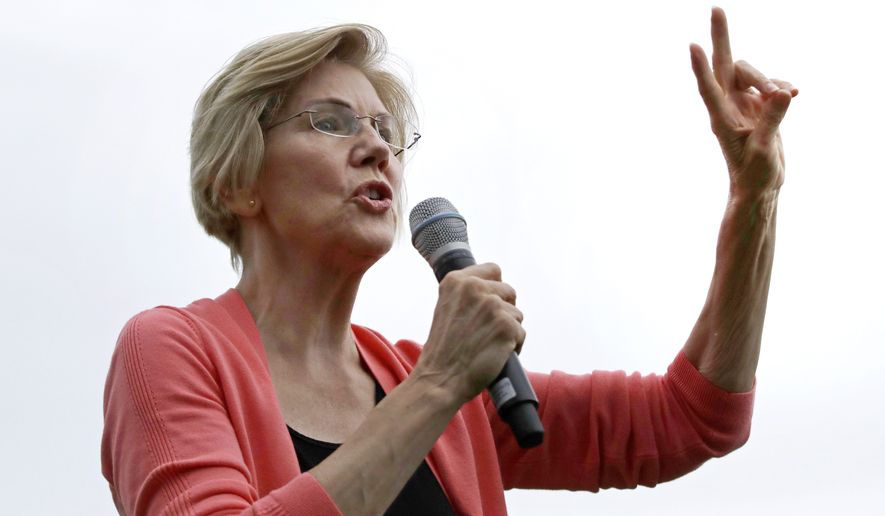Sen. Elizabeth Warren, Massachusetts Democrat, said Friday she would immediately ban fracking if elected president, drawing pushback from critics who said the move would cripple the U.S. oil-and-gas industry and force the nation to import fossil fuels.
“On my first day as president, I will sign an executive order that puts a total moratorium on all new fossil fuel leases for drilling offshore and on public lands. And I will ban fracking—everywhere,” tweeted Ms. Warren.
Her announcement came with environmentalists urging her to join Vermont Sen. Bernie Sanders, who issued a statement Wednesday calling for a “full fracking ban on public and private lands,” putting the two progressives at the anti-fracking forefront of the 2020 Democratic presidential primary field.
Environmental groups have decried hydraulic fracturing as a threat to public safety and the climate, while critics warned that a nationwide ban would deal a devastating blow to the economy. Most U.S. oil-and-gas extraction involves fracking.
University of Colorado professor Roger A. Pielke Jr. said that Ms. Warren’s plan would force the nation to rely on foreign fossil-fuel imports.
“This is a big promise, both to ban fracking and to do it everywhere on day 1 of a Warren administration,” tweeted Mr. Pielke. “Banning fracking would kill off the ~entire US oil and gas extraction industry and turn the US into a major importer of fossil fuels. It would not reduce FF consumption.”
This is a big promise, both to ban fracking and to do it everywhere on day 1 of a Warren administration.
— Roger Pielke Jr. (@RogerPielkeJr) September 6, 2019
Banning fracking would kill off the ~entire US oil and gas extraction industry and turn the US into a major importer of fossil fuels.
It would not reduce FF consumption.
⤵️ https://t.co/SblwXeuEUB
Daniel Turner, executive director of the pro-industry Power the Future, said that Ms. Warren is “the same person who loves to call Donald Trump a ’dictator.’”
“Yet she is the one wanting to singlehandedly end an entire industry with the stroke of her pen!” tweeted Mr. Turner.
The U.S. Energy Information Administration predicted in January that the nation would become energy independent by 2020 after becoming a net oil exporter for the first time in 75 years, thanks in large part to the energy boom, fueled by hydraulic fracturing and other technological breakthroughs.
So you WANT more instability in the Middle East as a result; and all that entails globally? March more troops to their death? You DO realize that the US will have to import the difference? Shale oil now accounts for 2/3rd’s of US oil production, Lizzy.
— Samir Madani (@Samir_Madani) September 7, 2019
In 2018, nearly two-thirds of the U.S. electrical grid was powered by fossil fuels—natural gas, coal and petroleum—while nuclear energy accounts for 19%. Ms. Warren said at Wednesday’s CNN town hall that she opposes nuclear power for safety reasons.
That leaves renewables, which made up 17% of U.S. electrical generation, including 7% from hydropower and 6.6% from wind. Solar energy contributed less than 2%, according to the EIA.
U.S. carbon-dioxide emissions have fallen over the last decade, a phenomenon attributed to power plants replacing coal with natural gas, which has become cheaper and more abundant as a result of the shale revolution.
“The substitution of natural gas for coal is almost single-handedly responsible for the massive reduction in carbon emissions we have seen in the US over the past few years,” tweeted conservative pundit Ben Shapiro. “So Warren’s plan is to ban fracking and nuclear power plants to fight climate change?”
At CNN’s town hall Wednesday on the “climate crisis,” fracking was a hot topic. All the top Democratic presidential candidates have come out in favor of barring new oil and gas leases on federal land, and several have taken it a few steps further.
Senator Sanders is right. Fracking destroys water systems and causes disease in the communities where it is done. #GiveADem https://t.co/hywaq9gCUp
— Mark Ruffalo (@MarkRuffalo) September 4, 2019
“There’s no question I’m in favor of banning fracking,” said Ms. Harris, “and starting what we can do on day one around public lands.”
Such positions come in sharp contrast to those of President Trump, who has made U.S. energy independence a top priority of his administration.
Four states — Vermont, Maryland, New York and Washington — have banned fracking within their borders, although the Vermont and Washington bans were largely symbolic, given that neither has known frackable reserves.
• Valerie Richardson can be reached at vrichardson@washingtontimes.com.




Please read our comment policy before commenting.